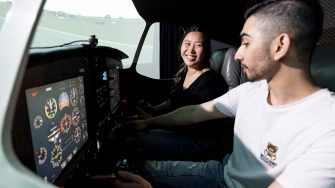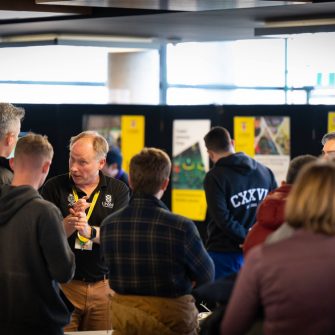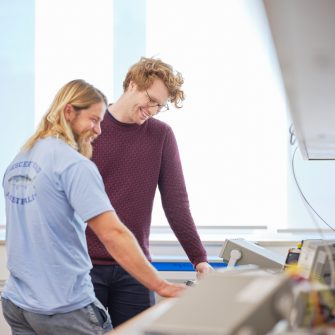Bachelor of Aeronautical Engineering (Honours) (Canberra)
- Commencing Terms
- Semester 1
- Duration
- 4 Year(s)
- Delivery Mode
- Face-to-face (includes blended)
- Campus
-
Canberra
- Codes
- UAC code 450040 - Defence
- Program code 4472
- CRICOS code -
-
ATAR/2025 lowest selection rank
- 85.0 View all admission criteria
-
2026 Indicative first year full fee
- $7,500*
-
2026 Indicative full fee to complete degree
- $37,000*
-
2026 Indicative first year full fee
- -
-
2026 Indicative full fee to complete degree
- -

The Australian Defence Force Academy
Combining teaching and research with military education
UNSW Canberra specialises in high-quality undergraduate and postgraduate courses in all areas relating to military, strategic and defence studies. This means future leaders of the Navy, Army and Air Force can combine their military and leadership training with our world-class university programs and defence industry expertise.
- Overview
- Entry requirements
- What will I study?
- Future careers
- How to apply
- Fees
Overview
Prepare to launch your career in aerospace and aviation with a hands-on degree from UNSW Canberra. The Bachelor of Aeronautical Engineering (Honours) equips you with the skills to design, build and maintain aircraft and aerospace systems and drive innovation in aviation, aerospace and beyond.
This four-year full-time undergraduate degree, including an integrated Honours year, covers the fundamentals of aeronautics, aerodynamics, aircraft design and engine propulsion. Complement your core learning with a series of electives, complete an independent research project and get 60 days of on-the-ground experience in a professional aeronautical engineering environment.
With access to purpose-built workshops, state-of-the-art facilities and industry-focused projects, you’ll gain the technical skills and knowledge to make a meaningful contribution to the aeronautical engineering space. You’ll unlock opportunities across diverse industries, including roles in the Australian Defence Force and private sector, working for big names like Airbus or SpaceX.
Key features
Deep aerospace expertise
Develop specialised expertise and skills to develop the aircraft and spacecraft of tomorrow. Gain knowledge in aerodynamics, aircraft design and propulsion systems. Tailor your degree to your career goals and interests with electives like hypersonic flight, rotorcraft design, or space mission design.
Put your skills into practice
Gain practical experience through a 60-day professional internship and hands-on projects in state-of-the-art facilities, allowing you to apply classroom knowledge to real-world aeronautical engineering challenges.
Specialised Defence-focused curriculum
Tailored to meet the needs of the ADF, this program covers essential topics in aerodynamics, aircraft design and engine propulsion, preparing graduates for roles across the Air Force, Army and Navy.
Why study at UNSW Canberra?
World-class aerospace facilities
Get hands-on experience in state-of-the-art laboratories and workshops designed specifically for aeronautical engineering. Access world-class facilities where you’ll engage in hands-on learning, working with advanced tools and technology that mirror real-world engineering environments.
Engineers Australia accreditation
Graduate with a degree accredited by Engineers Australia, the professional standard for engineering qualifications in Australia and recognised worldwide. Wherever you choose to pursue a career, this respected accreditation enhances your employability and shows you’re ready to tackle the challenges of an evolving aerospace and aviation industry.
Strong industry connections
Leverage UNSW Canberra’s extensive network of industry connections to kickstart your career. Through industry-focused projects and internships, you’ll learn from and work with experts in the aerospace and aviation sectors, opening doors to future opportunities.
Want to see more from UNSW Canberra at ADFA?
Entry requirements
-
- The 2025 Lowest Selection Rank (LSR) is the adjusted rank (ATAR plus adjustment factors) you would have needed to gain entry to this degree in 2025.
- The 2025 A levels score is based on four Advanced Level (A2) subjects. Entry scores are calculated from the best three or four A2 subjects (excluding repeated subjects) using the following values: A*=6, A=5, B=4, C=3, D=2, E=1. At most one Applied A Level subject may be included in the best four subjects used to calculate the aggregate.
- The 2025 IB Diploma is an indication of the IB you would have needed to gain entry to this degree in 2025. It is to be used as a guide only.
- The 2025 Lowest ATAR is the lowest ATAR (before adjustment factors were applied) to which an offer was made. Where <5 is listed, this indicates that less than 5 ATAR-based offers were made and so the score has not been published. N/A indicates no offers were made on the basis of ATAR.
*The Lowest ATAR to which an offer was made, for this program, is based on a UNSW Gateway Early Conditional Offer.
-
At UNSW, we are committed to ensuring prospective students have all the information they need in order to make informed decisions about their study options.
To assist you in gaining a better understanding of how Admissions works at UNSW, we have provided you with a summary of ATAR offers and the student profile.
We hope this information will help you identify the degree that is right for you.
Assumed knowledge
Mathematics, Physics
Adjustment Factors
We offer a range of adjustment factor schemes that reward students for academic performance and extra-curricular achievements. These schemes also take into account a range of personal and educational disadvantages that may have affected your studies.
HSC Plus
This scheme rewards students who perform well in Year 12 subjects that are relevant to their preferred UNSW degree. You may be awarded up to five points.
Elite Athletes, Performers and Leaders (EAPL)
This program recognises achievements in the areas of sport, academia, leadership and music at an elite level. You may be eligible for up to five points.
Educational Access Scheme (EAS)
Factors such as illness, financial hardship, language difficulties or attending a particular school can mean you don't always get the best possible marks in Years 11 and 12. If one of these situations applies to you, submit an application for the Educational Access Scheme (EAS) via UAC. Eligible students can receive between 1 and 10 points towards their chosen UNSW degree.
Admission pathways
Your ATAR is not the only measure of your potential to succeed, which is why we offer a range of pathways into university. Explore your options below and get in touch with our Future Student Advisers to discuss your path to UNSW.
Gateway Admission Pathway
This scheme is open to students who attend Gateway schools, live in a low-socioeconomic area based on IRSAD and IEO indexes of SEIFA criteria, or are an Aboriginal and Torres Strait Islander person. It adjusts the ATAR requirements for your preferred UNSW degree and provides early offers and early conditional offers to UNSW.
Entry programs for Australian Aboriginal and Torres Strait Islander people
We offer entry programs for Indigenous Australians, including the Indigenous Preparatory Programs and the Indigenous Admission Scheme (IAS). The entry pathway program you apply for will depend on the degree you want to study.
English language requirements
You may be asked to provide evidence of your English proficiency to study at UNSW depending on your educational background and citizenship. English language skills are vitally important for coping with lectures, tutorials, assignments and examinations - this is why UNSW requires a minimum English language competency for enrolment.
If you’re completing an Australian Year 12 qualification (e.g. NSW HSC or equivalent), you do not need to provide anything extra to prove your proficiency. Your qualification will be used as evidence of your English proficiency.
If you do need to provide evidence of your English proficiency, this will be indicated in your application. You can prove this by providing evidence that you meet one or more of the following criteria:
- English language tests and university English courses
- Prior study in the medium of English
- Other qualifications
If you need to improve your English skills before you start your degree, UNSW College’s Academic English Programs are for you. The programs are suitable for various English levels and help you prepare for university studies and life in Australia.
For more details, visit the English Language Requirements page.
What will I study?
UNSW is introducing a new academic calendar from 2028.
We are moving to a new flex-semester calendar. What does this mean for your studies?
Program structure
The Bachelor of Aeronautical Engineering (Honours) is a four-year full-time program at UNSW Canberra. Open to Defence students, the program has been co-created designed to prepare you for the needs of the ADF, as well as the aviation and aerospace sectors more specifically.
In the first two years, you'll focus on core engineering principles before advancing to specialised aeronautical topics such as flight dynamics and aircraft performance. You can also choose electives in areas like hypersonic flight and rotorcraft design, tailoring your studies to your interests.
The program culminates in a final-year research project and a 60-day professional internship, so you’ll graduate with practical skills and hands-on experience that will set you up for a successful career.
Full program structure
Students must complete 192 UOC when taken as a standalone program.
-
- Introduction to Programming
- Engineering Practice and Design
- Engineering Mechanics
- Introduction to Mechanical, Aeronautical and Naval Architecture Engineering
- Engineering Mathematics 1A
- Engineering Mathematics 1B
- Computational Problem Solving
- Engineering Physics 1A
-
- Thermofluids
- Mechanical and Electronic Design
- Fundamentals of Flight
- Fluid Mechanics
- Mechanics of Solids
- Engineering Materials and Chemistry
- Engineering Mathematics 2A
- Engineering Mathematics 2B
-
- Engineering Structures
- Engineering Materials
- Aerodynamics
- Flight Dynamics and Aircraft Control
- Managing the Development of Engineered Systems
- Applied Thermodynamics and Propulsion
- Introduction to Cyber-Security: Policy & Operations
-
- Aircraft and Systems Design 1
- Engineering Project A
- Engineering Project B
- Aircraft and Systems Design 2
-
Space Stream
- Satellite Communications
- Space Mission Design
- Space Situational Awareness
Maritime Stream
- Naval Architecture Practice, Hydrostatics and Stability
- Electrical and Mechanical Plant
- Nuclear Propulsion and Its Assurance
- Building the Fleet: History, Politics and Naval Technology
Artificial Intelligence Stream
- Fundamentals of Artificial Intelligence
- Machine Learning
- Human-Artificial-Intelligence Teaming
- Natural Computation
- Deep Learning
Environmental Engineering Stream
- Environmental Engineering
- Geosynthetics and Ground Improvement
- Smart Grids and Renewable Energy
- Finite Element Method
Robotics and Autonomous Systems Stream
- Autonomous Robots
- Algorithms for Robotics and Autonomous Systems
- Advanced Robotics and Autonomous Systems
Other Technical Electives
- Vibration and Control Engineering
- Computational Fluid Dynamics
- Structural Integrity Assessment
- Rotorcraft Engineering
- Integrated Mechanical Design
- Occasional Elective 1
- Occasional Elective 2
- Hypersonics and Advanced Propulsion
- Impact Dynamics
- Microcontroller-based Instrumentation
-
One of the following:
- Introduction to Strategic Studies
- Strategy, Management and Leadership
One of the following:
- Law, Force and Legitimacy
- Introduction to Military Ethics
Future careers
Future careers in Defence
By studying aeronautical engineering at UNSW Canberra, you’ll be accredited by Engineers Australia to begin working immediately as an aeronautical engineer within the ADF and around the world.
Air Force
Air Force graduates operate and maintain aircraft. They become responsible for the airworthiness and modification of aircraft and engines and the acquisition and introduction of new equipment into the Australian fleet. Air Force careers for aeronautical engineers include:
- Aeronautical Engineer
- Armament Engineer
Army
As an Army graduate, you will be involved in the maintenance and repair of the Army’s rapidly growing fleet of fixed-wing and rotary-wing aircraft, including the ARH-Tiger, Chinook and MRH-90 Taipan helicopters, as well as other fixed-wing and rotary-wing aircraft. Army roles for aeronautical engineers include:
- Aeronautical Engineer
- Avionics Engineer
- Army Officer
Navy
As a Navy graduate, you will find yourself working with a variety of aircraft ranging from heavy transporters to multi-role strike fighters. You will engage in the maintenance, repair, modifications, operational deployments and airworthiness of the Navy’s fleet of rotary-wing aircraft. Careers in the Navy for aeronautical engineers include:
- Aerospace Engineer Officer
- Aircraft Electronics Engineer
Future careers in non-Defence roles
Prepare to join an industry poised for significant growth and transformation. The aerospace sector is seeing rapid expansion, driven by increased air travel, the rise of unmanned aerial systems (UAS) and advancements in aerospace technology. In Australia, aerospace engineering roles are expected to grow by 8.4% over the next five years (Seek, 2025). As new challenges and opportunities in renewable energy, advanced manufacturing and space exploration emerge, aeronautical engineers will play a key role in driving innovation, from designing cutting-edge aircraft to contributing to advancements in space technology.
Potential roles:
Aerodynamics Engineer
Aerospace Engineer
Aircraft Design Engineer
Aircraft Maintenance Engineer
Avionics Engineer
CAD Engineer
Computational Fluid Dynamics (CFD) Engineer
Design Engineer
Engineering Consultant
Flight Systems Engineer
Manufacturing Engineer
Mechanical Engineer
Performance Engineer
Project Engineer
Propulsion Engineer
Quality Assurance Engineer
Research and Development Engineer
Structural Engineer
Systems Engineer
Test Engineer
Accreditation
Engineers Australia
Alumni testimonial
“I have been interested in engineering as far back as I can remember. I have always been excited by the way engines and aircraft work and move. So far, I’ve been exposed to a multitude of different learning environments, from lectures to hands-on workshops. The highlight so far was learning how to operate equipment and machinery required to design and build systems. The opportunity to develop hands-on skills such as welding, oxyfuel cutting and working with a lathe is unique to UNSW Canberra.”
- Dominic Hill, Aeronautical Engineering student
How to apply
Applications for undergraduate study from domestic students (Australian citizens, Australian permanent residents, Australian permanent humanitarian visa holders and New Zealand citizens) are processed by the Universities Admissions Centre (UAC).
Visit the Apply section of the UAC website and you can nominate up to five degrees in order of preference, with the first being your most desired degree and university.
On-time applications for admission usually close at the end of September each year for Term 1 admission. Late applications can be submitted, but a late fee will apply. For study starting in Term 1, the majority of offers are made in December and January. Visit the UAC website for key dates for admission outside of Term 1.
Applying for programs at UNSW Canberra at ADFA is a dual application process. In addition to applying via UAC you will also need to apply via ADF Careers for an officer role within the Australian Defence Force. As selection for the Australian Defence Force is a competitive process, which can take up to 12 months, it is preferable that you apply to Defence Force Recruiting in Year 11.
Visit our how to apply page for more information on both application processes.
Ready to start your application?
Fees & Scholarships
The Australian Defence Force covers tuition fees for defence students.
Scholarships
At UNSW, we award over $83 million in scholarships each year. We pride ourselves on rewarding excellence and making university accessible to students from all walks of life. Whether you’re a domestic or international student, our range of scholarships, prizes and awards can support your journey.
Progress starts here – at a world-leading university

Top 20 Worldwide
Ranked in the global top 20 for three consecutive years
QS World University Rankings, 2024–2026

Winner of the AFR Most Employable University Award six years in a row
AFR Top100 Future Leaders Awards, 2020–2025

Australia's #1 for Innovation
Highest number of startups and spinouts from university-developed tech
SCOPR report, 2024



